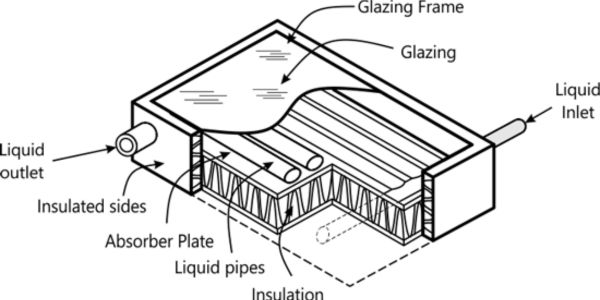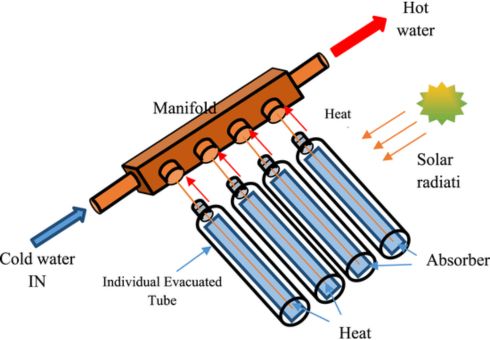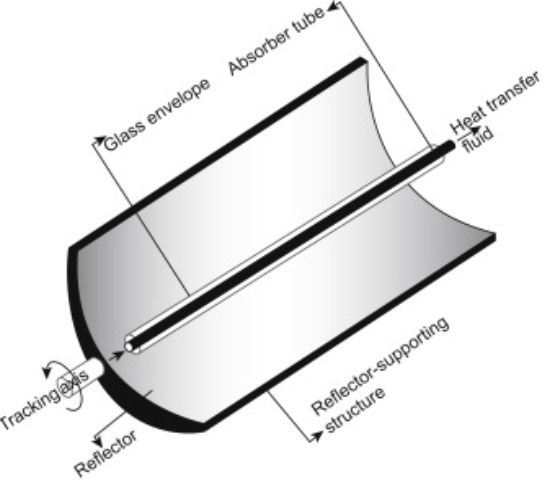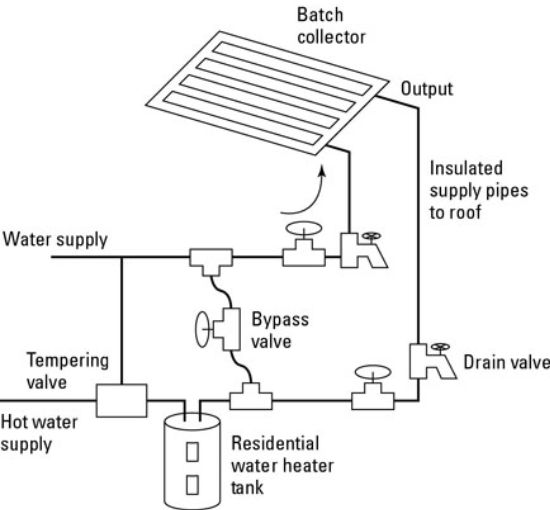The cost of a solar water heater is dependent on several factors, including system, capacity, manufacturer and location. However, while the investing in a solar water heater may be costlier than established alternatives, they can offer significant long-term savings.
The following excerpt delves into the costs associated with solar water heaters described as follows:
Cost of Solar Water Heaters Based on the Type of Solar Collector
The cost of solar water heaters is influenced by the solar collector type used in the system
· Flat-Plate Collectors
They are essentially flat, oblong-shaped boxes, hence the name, containing an absorber plate for solar energy capture.
Their simple construction makes them comparatively cheaper than other collector types ranging from about $1,000 to $6,000 or more. The cost of obtaining one is dependent on the brand/manufacturer, size and location which influences installation costs.
Flat-plate collectors are usually employed in areas with moderate climates for small scale applications like residential and small commercial areas.

· Evacuated Tube Collectors
With evacuated tube collectors, efficiency is marginally superior to flat-plate collectors, more so in colder climates. They feature parallel vacuumed glass tubes to reduce heat loss and allows effectiveness in diffuse sunlight conditions or low temperatures.
Thanks to the improved efficiency, evacuated tube collectors cost higher than flat-plate collectors. Consequently, solar water heaters utilizing these collectors can range from $1,500 to over $8,000 depending on the system size and brand.
These solar collectors are preferred in areas with colder climates and/or where high-performance solar heating is desired.

· Concentrating Collectors
These are the most advanced and expensive solar collectors you can find in solar water heating systems. By utilizing mirrors or lenses to concentrate sunlight onto a smaller absorber area, they significantly increase the absorbed energy’s temperature.
Even though concentrating collectors can achieve very high temperatures, their complexity calls for sophisticated sun tracking systems. Solar water heaters using concentrating collectors can cost as high as $20,000 from around $4,000 depending on the tech applied and size.
Solar water heaters using these collectors are implemented in large-scale commercial or industrial applications with high-temperature heating needs.

Cost of Solar Water Heaters Depending On the System Employed
The system type and associated components will influence the cost of solar water heating systems. Solar water heater systems can be described as active or passive as follows:
Active Systems
Active systems utilize mechanical devices like electric pumps to circulate water or the heat transfer fluid through the solar collectors. There are two subtypes of active solar water heater systems: direct circulation and indirect circulation systems.
a) Direct Circulation Systems
These systems are simpler and generally less expensive with the main components being the solar collectors and a storage tank. Active direct circulation systems utilize electric pumps in the circulation of water directly through the collectors into the storage tank.
They are more suitable for warmer climates not concerned with freezing temperatures costing from $3,000 to $5,000. Factors like brand, size, complexity and installation requirements affect the overall cost.
b) Indirect Circulation Systems
Indirect circulation systems have increased sophistication that includes additional components like heat exchangers, specialized heat transfer fluid and pumps. The heat transfer fluid utilizes a mixture of water and antifreeze in absorbing heat from captured solar energy.
The complexity of this system contributes to the higher cost compared to direct systems ranging anywhere from $5,000 to $10,000. Factors like capacity and quality will affect the costing, working well in colder climates where freezing temperatures are common.
Some indirect circulation systems utilize drainback valves or pressurized glycol for further protection from freezing during cold weather. Such systems cost even more and can exceed $12,000 depending on the design and capacity.
Passive Systems
Passive systems circulate water through the solar collectors using natural convection dismissing the need for mechanical components like pumps or controllers. There are two classifications of passive systems: integral collector storage systems and thermosiphon systems.
a) Integral Collector Storage (ICS) Systems
Also known as batch systems, these are the simplest and most affordable when used for solar water heaters. They integrate the collector and storage tank into a single unit with costs ranging from $1,000 to about $3,000. The water serves as the heat transfer fluid being directly heated by the sun with no pumps or controllers involved.

b) Thermosiphon Systems
While thermosiphon systems also eliminate the need for pumps, they entail a design slightly more complex than ICS systems. They consist of a separate solar collector and storage tank, with the former positioned higher than the latter.
This design allows natural convection to circulate water between the collector and the tank without requiring pumps. Even though slightly more complex than ICS systems, they are still cost-effective coming at about $2,000 to $6,000.
Cost of Solar Water Heaters Based on their Size
Before deciding on your solar water heater capacity, consider your household’s needs. Larger systems typically require more materials and components, leading to higher costs albeit with significant long-term savings on energy bills.
The storage tank capacity essentially dictates the size of a solar water heater and is provided in liters or gallons. A larger storage capacity allows you to store more hot water.
Below are approximate cost ranges for solar water heaters based on their size:
Small
A solar water heater system with a capacity between 75-190 liters (20-50 gallons) is considered small. Such solar water heaters are ideal for small households with low demand for hot water limited to point-of-use water heating.
These systems are generally less expensive thanks to their reduced storage capacity and lower material requirements. They’d typically cost from as low as $1,500 to about $3,500.
Medium
These solar water heaters have a capacity range of 190-300 liters (50-80 gallons). They offer a good balance between capacity and cost-effectiveness, suitable for average-sized households with moderate hot water requirements. They can cost anywhere from $2,500 to $5,000.
Large
Capacities ranging over 300 liters (80 gallons) suit the large-size tag. They cater for homes with a high demand of hot water or commercial applications. The higher storage capacity means increased cost to cater for more materials and components. Such a solar water heater can range from $4,000 to $10,000 or more.
Note that these cost ranges are approximate and can vary with location, system type (active or passive) and manufacturer. Additionally, the efficiency of the solar collectors and overall system design can attribute to the total cost.
Installation Cost
Various factors influence the installation cost of a solar water heater. These are not limited to the system type and complexity, location and accessibility, labor rates, and even plumbing or electrical needs.
Given, the installation cost of a solar water heater can range from around $2,000 to $5,000 or more. Nonetheless, it’s essential to note these figures are approximate estimates and can vary based on the factors mentioned above.
For an accurate installation cost for your project, try and obtain quotations from multiple installers or suppliers in your area. Also inquire about any potential supplementary costs or need for upgrades to your installation site.
Some suppliers will offer primary installation of their products as an after-sale service not extending to plumbing works. Some key factors that influence the cost of installing a solar water heater are highlighted below:
- Additional Components: The system design can require additional components like heat exchangers, controllers, and expansion tanks which can increase installation cost.
- Location: The geographic location dictates the local building codes, permits, and regional labor rates which influence overall installation cost.
- Labor: Hiring a professional with expert knowledge is necessary for proper and dependable installation. However, their labor rates may be high increasing the overall installation cost albeit in exchange for reliability.
- Roof Type and Orientation: Roofs can be flat or sloped varying difficulty during orientation of the solar water system toward the sun. Where additional supports or reinforcement’s are required on the roof to hold the solar collectors installation cost increases.
- System Size: Installation cost is affected by the size of the solar water heater system required to meet the household’s demand. Larger systems may require more extensive plumbing work and take more time to install swelling costs.
- System Type: The different types of solar water heaters have varying installation complexities. For instance, passive systems present less intrigues during installation and thus have attach installation costs. Contrarily, active systems incorporate pumps and controllers which balloon the installation costs.
Regulatory Costs
Regulatory costs associated with solar water heaters can vary with the country, and/or local government policies, and reach hundreds of dollars. These costs typically involve complying with safety and environmental standards, obtaining permits and meeting building code requirements.
Research and understand the specific regulatory requirements in your area before installing a solar water heater. Local building departments, licensing offices, and utility companies can provide information on the necessary permits and codes.
Additionally, engaging an expert or professional installer familiar with local regulations can be useful. They can help navigate the intricacies of requisites and minimize risk of non-compliance that can lead to additional costs or delays.
Nonetheless, remember, depending on your location, there may be incentives like rebates or tax credits for installing solar water heaters. This can help offset some of your installation expenses.
The following list identifies some common regulatory costs that could be associated with solar water heaters:
Building Code Compliance
Specific building codes and guidelines ensure solar water heater installations adhere to fire safety, structural integrity, and proper installation practices. Sometimes, in order to comply, additional materials or modifications may be required to meet these standards contributing to the regulatory costs.
Electrical and Plumbing Inspections
Some solar water heaters may require electrical and plumbing connections. As such, there may be need for certified professionals to carry out verification inspections. These inspections ensure proper and safe installation of the system and might attach associated fees for the process.
Environmental and Energy Certifications
Some regions have environmental or energy efficiency certifications targeted to solar water heaters to qualify them for incentives or rebates. There might be tests and verification checks undertaken before obtaining these certifications.
Interconnection Fees
Some solar water heater systems utilize grid-tied components or integrate to the main electrical grid. In this instance, the primary utility company can levy interconnection fees. These fees cover the cost in connecting the solar water heater system to the grid ensuring safe and efficient operation.
Permits
You may require a permit from your local authority to install a solar water heater. Permits show approval that your system complies with prevailing safety and building regulations. The costs to acquire such can vary with the location and installation complexity.
Environmental Impact Assessments
Environmental impact assessments are reserved for large-scale solar water heater installations in some regions. Such are required when there’s need to evaluate the potential effects on the local ecosystem and environment. These assessments can result in additional costs for a solar water heater installation project.
At Ensun we sell solar water heaters at competitive prices while supporting your OEM business. Contact us today for all your solar water heating systems.


